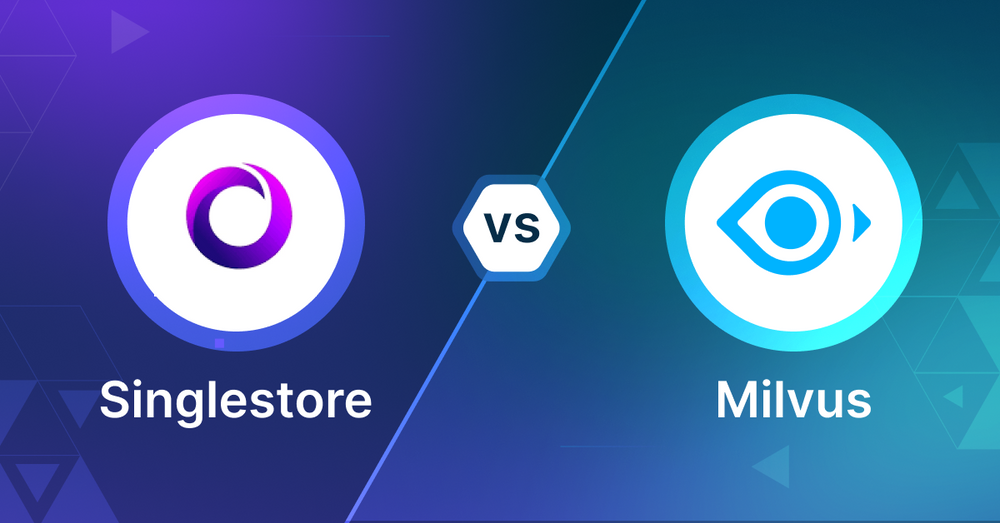SingleStore vs Milvus Choosing the Right Vector Database for Your AI Apps

What is a Vector Database?
Before we compare SingleStore and Milvus, let's first explore the concept of vector databases.
A vector database is specifically designed to store and query high-dimensional vectors, which are numerical representations of unstructured data. These vectors encode complex information, such as the semantic meaning of text, the visual features of images, or product attributes. By enabling efficient similarity searches, vector databases play a pivotal role in AI applications, allowing for more advanced data analysis and retrieval.
Common use cases for vector databases include e-commerce product recommendations, content discovery platforms, anomaly detection in cybersecurity, medical image analysis, and natural language processing (NLP) tasks. They also play a crucial role in Retrieval Augmented Generation (RAG), a technique that enhances the performance of large language models (LLMs) by providing external knowledge to reduce issues like AI hallucinations.
There are many types of vector databases available in the market, including:
- Purpose-built vector databases such as Milvus, Zilliz Cloud (fully managed Milvus)
- Vector search libraries such as Faiss and Annoy.
- Lightweight vector databases such as Chroma and Milvus Lite.
- Traditional databases with vector search add-ons capable of performing small-scale vector searches.
SingleStore is a distributed, relational, SQL database management system vector search as an add-on. Faiss are open-source, lightweight libraries built for efficient vector search. This post compares their vector search capabilities.
SingleStore: Overview and Core Technology
SingleStore has made vector search possible by putting it in the database itself, so you don’t need separate vector databases in your tech stack. Vectors can be stored in regular database tables and searched with standard SQL queries. For example, you can search similar product images while filtering by price range or explore document embeddings while limiting results to specific departments. The system supports both semantic search using FLAT, IVF_FLAT, IVF_PQ, IVF_PQFS, HNSW_FLAT, and HNSW_PQ for vector index and dot product and Euclidean distance for similarity matching. This is super useful for applications like recommendation systems, image recognition and AI chatbots where similarity matching is fast.
At its core SingleStore is built for performance and scale. The database distributes the data across multiple nodes so you can handle large scale vector data operations. As your data grows you can just add more nodes and you’re good to go. The query processor can combine vector search with SQL operations so you don’t need to make multiple separate queries. Unlike vector only databases SingleStore gives you these capabilities as part of a full database so you can build AI features without managing multiple systems or dealing with complex data transfers.
For vector indexing SingleStore has two options. The first is exact k-nearest neighbors (kNN) search which finds the exact set of k nearest neighbors for a query vector. But for very large datasets or high concurrency SingleStore also supports Approximate Nearest Neighbor (ANN) search using vector indexing. ANN search can find k near neighbors much faster than exact kNN search sometimes by orders of magnitude. There’s a trade off between speed and accuracy - ANN is faster but may not return the exact set of k nearest neighbors. For applications with billions of vectors that need interactive response times and don’t need absolute precision ANN search is the way to go.
The technical implementation of vector indices in SingleStore has specific requirements. These indices can only be created on columnstore tables and must be created on a single column that stores the vector data. The system currently supports Vector Type(dimensions[, F32]) format, F32 is the only supported element type. This structured approach makes SingleStore great for applications like semantic search using vectors from large language models, retrieval-augmented generation (RAG) for focused text generation and image matching based on vector embeddings. By combining these with traditional database features SingleStore allows developers to build complex AI applications using SQL syntax while maintaining performance and scale.
Overview of the Milvus Vector Database
Milvus is an open-source vector database designed from the ground up for vector search and similarity search at its core. It is highly performant and horizontally scalable at a billion scale and can run efficiently across a wide range of environments, from laptops to large-scale distributed systems. Milvus is available as both open-source software and a cloud service (Zilliz Cloud).
Milvus supports at least 11 indexing methods, including HNSW (Hierarchical Navigable Small World), IVF (Inverted File), DiskANN, and CAGRA, allowing it to quickly search through large volumes of data. Unlike Cassandra, Milvus is not a general-purpose database but a focused tool for unstructured data and vector similarity search, making it a more specialized solution.
Milvus is part of the LF AI & Data Foundation and is licensed under Apache 2.0. Many contributors are experts in high-performance computing (HPC), with backgrounds in building and optimizing large-scale systems. Key contributors include professionals from companies like Zilliz, ARM, NVIDIA, AMD, Intel, Meta, IBM, Salesforce, and Microsoft.
Milvus offers three deployment options: Milvus Lite, Standalone, and Distributed.
- Milvus Lite is a Python library and an ultra-lightweight version of Milvus. It’s perfect for rapid prototyping in Python or notebook environments and for small-scale local experiments.
- Milvus Standalone is the single-node deployment option for Milvus, using a client-server model. You can think of it as the Milvus equivalent of MySQL, while Milvus Lite is like SQLite.
- Milvus Distributed is Milvus's distributed mode, ideal for enterprise users building large-scale vector database systems or vector data platforms.
Key Differences
Search Methodology
SingleStore: Offers both exact k-Nearest Neighbors (kNN) search and Approximate Nearest Neighbors (ANN) search. While exact kNN ensures more precision, ANN provides faster queries for large datasets, sacrificing some accuracy for speed. SingleStore's support for multiple ANN methods (e.g., IVF_FLAT, IVF_PQ, HNSW_PQ) makes it versatile for hybrid workloads combining traditional SQL queries with vector search.
Milvus: Specializes in vector similarity search with extensive support for 11+ indexing methods, including HNSW, IVF, DiskANN, and CAGRA. These indexes are optimized for performance and flexibility, enabling Milvus to handle diverse vector search scenarios at scale. Its indexing options make it a better choice for pure vector search tasks requiring high configurability. Milvus also supports kNN, ANN, Range Search, Full-text search, and Hybrid Search for a more diverse set of search queries that helps to find the most relevant results.
Data Handling
SingleStore: Integrates vector data into a general-purpose relational database, storing vectors in columnstore tables alongside structured and semi-structured data. This setup enables seamless filtering and aggregation with standard SQL queries, making it ideal for applications that combine structured metadata with unstructured vector data.
Milvus: Focuses exclusively on unstructured data, making it purpose-built for use cases like image recognition, document retrieval, and recommendation systems. If you’re dealing with datasets that are primarily vectors without heavy reliance on structured data, Milvus provides a more tailored solution.
Scalability and Performance
SingleStore: Scales horizontally by distributing data across multiple nodes. As your data grows, adding nodes is straightforward, and its SQL query processor efficiently merges vector search with standard database operations. However, its vector capabilities are part of a broader database system, which may introduce overhead for pure vector workloads.
Milvus: Designed for billion-scale vector search with horizontal scalability as a core feature. Its distributed mode ensures high performance for large-scale deployments. Milvus's architecture is optimized for scenarios where vector search is the primary workload, delivering lower latency and better efficiency for such use cases.
Flexibility and Customization
SingleStore: Provides flexibility in combining vector search with SQL operations. However, vector indexing is limited to specific configurations (e.g., F32 element type, single-column vectors in columnstore tables). This structured approach suits applications requiring tight integration with traditional database functionalities.
Milvus: Offers extensive customization for indexing, search parameters, and deployment modes. With options like Milvus Lite for embedded environments, Milvus Standalone for local experiments and Distributed Milvus for large-scale environments, it caters to a wide range of workflows.
Integration and Ecosystem
SingleStore: Excels in its integration with standard SQL-based tools and workflows, enabling developers to use familiar technologies without steep learning curves. Its compatibility with AI and analytics tools enhances its utility in hybrid applications.
Milvus: Focuses on integrations with AI and machine learning ecosystems. It supports embedding models and works well in retrieval-augmented generation (RAG) pipelines and applications requiring dense vector processing. Its open-source nature also allows developers to extend and adapt it to specific needs.
Ease of Use
SingleStore: Combines the simplicity of SQL with vector capabilities, making it accessible to developers familiar with relational databases. However, the structured approach to vector handling may require adjustments for unstructured data-heavy workloads.
Milvus: Designed for vector search from the ground up, it offers a more specialized experience. While its distributed mode can introduce complexity, its standalone and lite versions simplify experimentation and smaller-scale deployments.
Cost Considerations
SingleStore: By integrating vector search into a full database, SingleStore reduces the need for multiple systems, potentially lowering operational costs. However, its pricing as a general-purpose database may include features you don’t need for vector-specific workloads.
Milvus: Open-source Milvus provides a cost-effective entry point, with the flexibility to scale into managed services like Zilliz Cloud. Its focus on vector search ensures you’re only paying for the features you need.
Security Features
SingleStore: Offers robust enterprise-grade security features, including encryption, authentication, and access controls. Its comprehensive database functionality makes it a strong choice for applications requiring stringent compliance.
Milvus: While security features are available, the specifics depend on the deployment model (e.g., standalone vs. cloud). For enterprise use cases, Zilliz Cloud provides enhanced security capabilities.
Conclusion
Pick one based on your use case and ecosystem:
SingleStore if you want a hybrid solution that combines structured data processing with vector search. Good for e-commerce or enterprise analytics where SQL and vector queries need to live together.
Milvus if you need a vector database optimized for large scale unstructured data and AI workloads. Good for projects that rely heavily on similarity search like recommendation engines or retrieval-augmented generation systems.
Milvus for vector centric, developer friendly and scalable. SingleStore for structured data and vectors in one system.
Read this to get an overview of SingleStore and Milvus but to evaluate these you need to evaluate based on your use case. One tool that can help with that is VectorDBBench, an open-source benchmarking tool for vector database comparison. In the end, thorough benchmarking with your own datasets and query patterns will be key to making a decision between these two powerful but different approaches to vector search in distributed database systems.
Using Open-source VectorDBBench to Evaluate and Compare Vector Databases on Your Own
VectorDBBench is an open-source benchmarking tool for users who need high-performance data storage and retrieval systems, especially vector databases. This tool allows users to test and compare different vector database systems like Milvus and Zilliz Cloud (the managed Milvus) using their own datasets and find the one that fits their use cases. With VectorDBBench, users can make decisions based on actual vector database performance rather than marketing claims or hearsay.
VectorDBBench is written in Python and licensed under the MIT open-source license, meaning anyone can freely use, modify, and distribute it. The tool is actively maintained by a community of developers committed to improving its features and performance.
Download VectorDBBench from its GitHub repository to reproduce our benchmark results or obtain performance results on your own datasets.
Take a quick look at the performance of mainstream vector databases on the VectorDBBench Leaderboard.
Read the following blogs to learn more about vector database evaluation.
Further Resources about VectorDB, GenAI, and ML
- What is a Vector Database?
- SingleStore: Overview and Core Technology
- Overview of the Milvus Vector Database
- Key Differences
- Using Open-source VectorDBBench to Evaluate and Compare Vector Databases on Your Own
- Further Resources about VectorDB, GenAI, and ML
Content
Start Free, Scale Easily
Try the fully-managed vector database built for your GenAI applications.
Try Zilliz Cloud for FreeKeep Reading

How to Use Anthropic MCP Server with Milvus
Discover how Model Context Protocol (MCP) pairs with Milvus to eliminate AI integration hassles, enabling smarter agents with seamless data access and flexibility.

Milvus WebUI: A Visual Management Tool for Your Vector Database
Milvus WebUI is a built-in GUI introduced in Milvus v2.5 for system observability. WebUI comes pre-installed with your Milvus instance and offers immediate access to critical system metrics and management features.

Empowering Women in AI: RAG Hackathon at Stanford
Empower and celebrate women in AI at the Women in AI RAG Hackathon at Stanford. Engage with experts, build innovative AI projects, and compete for prizes.
The Definitive Guide to Choosing a Vector Database
Overwhelmed by all the options? Learn key features to look for & how to evaluate with your own data. Choose with confidence.